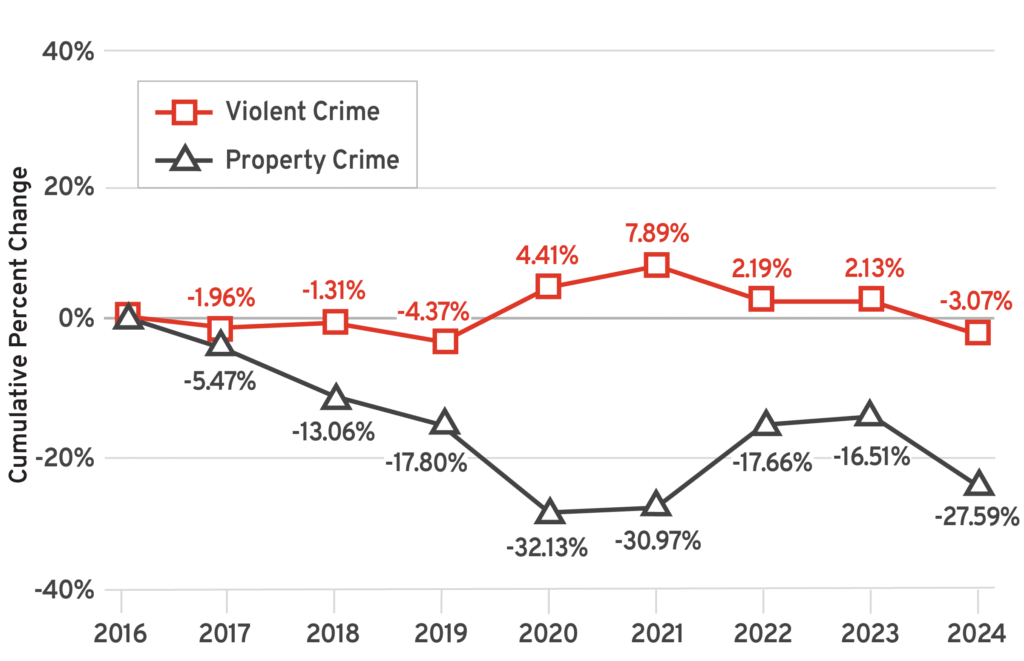Michigan’s Criminal Justice Crossroads: Opportunities for Pre-Arrest, Pretrial, and Post-Conviction Change in the Great Lakes State
Nov 18, 2025
Authors
Jillian Snider
Resident Senior Fellow, Criminal Justice and Civil Liberties
Lisel Petis
Policy Director, Criminal Justice and Civil Liberties
Sarah Anderson
Associate Director, Criminal Justice and Civil Liberties
Media Contact
For general and media inquiries and to book our experts, please contact: pr@rstreet.org
Criminal Justice System Profile
Recent Crime Trends

Justice system expenditures (per capita, FY 2021)
Courts: $150-$200
Corrections: $150-$250
Police: Over $300
22.7%
Community supervision population (2023)
122,000
Violent crime clearance rates (2024)
48%
Current incarcerated population/rate
Jail and prison populations (2023): Total ~53,000
Incarceration rate per 100,000 (2024): 535 (34th/50)
Strengths to Build On
- Alternate response models to address behavioral health challenges in communities have seen success in Michigan. Several cities, including Ann Arbor, have piloted unarmed, community-based response teams that handle nonviolent behavioral health and welfare checks without police presence when appropriate. Departments like Waterford Township Police have adopted co-responder models that pair trained mental health professionals with officers to manage crisis calls more safely and effectively.
- In response to the recommendations of Michigan’s 2019 Jail and Pretrial Incarceration Task Force report, lawmakers passed several policies in 2020 aimed at limiting unnecessary pretrial detention for low-risk individuals. These included expanding the use of “appearance tickets” rather than arrest for certain low-level offenses and requiring courts to issue a summons rather than a bench warrant for most first-time failures to appear on misdemeanor offenses.
- In 2020, Michigan enacted its “clean slate” record-sealing law, which provided for the automatic expungement of certain criminal records without an application for individuals after a specified number of years crime free. This law went into effect in April 2023, with more than a million Michigan residents having their convictions expunged immediately. Eligible individuals will have theirs expunged into perpetuity. As a result, millions of individuals who demonstrate rehabilitation will get a real second chance to move on from past mistakes and remain productive members of society without the burden of lingering criminal records.
Persistent Challenges
- Case clearance gaps continue to undermine public trust in Michigan’s justice system, with only 42 percent of violent crimes and 12.8 percent of property crimes solved in 2024. In cities like Detroit and Ann Arbor, rising backlogs of unsolved homicides and assaults leave communities anxious for justice and offenders undeterred.
- Michigan has not published any statewide data on pretrial practices and outcomes since the 2019 Jail and Pretrial Incarceration Task Force report. There is no public source tracking how local courts make release decisions or use bail, and no public data exists on the outcomes of recently implemented reforms. Without reliable, current information, the state cannot evaluate whether pretrial practices—including changes made in 2020—are upholding safety, ensuring individuals come to court, and maintaining fiscal responsibility.
- Currently, about half of Michigan’s prisons are understaffed, and 13 of the state’s 31 correctional facilities have staff vacancy rates of 18 percent or higher. This creates compounded problems inside of carceral institutions, as demands on staff increase for overtime work— even consecutive days of 16-hour shifts. Not only is prison understaffing less than ideal for the correctional officers themselves, it also makes it difficult to control illicit drug use and the possession of improvised weapons in incarcerated populations. Addressing this issue is critical to protect correctional officers from dangerous conditions and to ensure more stable environments for those incarcerated to promote rehabilitation and reduce recidivism upon release.
Practical Solutions
- To help law enforcement solve more violent crimes by hiring and training investigators, upgrading forensic and evidence-processing technology, and providing victim support, Sen. Stephanie Chang (D-District 3) and Rep. Sarah Lightner (R-District 45) introduced the Violent Crime Clearance Act, which would establish a state grant program for these purposes. Solving crimes is important because unsolved serious crimes heighten public safety risks, undermine confidence in law enforcement, and threaten long-term community stability.
- Michigan would benefit from a consistent, statewide approach to collecting and sharing court data. Regular, transparent updates—whether through a public-facing dashboard or another accessible format—could help evaluate how pretrial practices are working to address safety and fairness. Over time, this would support more informed decisions about tools like automated court reminders, supervision and support services, and pretrial release decisions.
- Michigan should work to ensure that sentencing aligns with the seriousness of the offense, considers individual circumstances, and allows for resentencing when there is clear evidence of rehabilitation. Public safety is better served when those who do not need to be incarcerated can access safe paths to resentencing. Sentencing should also recognize crimes committed as a direct result of trauma or victimization. Legislation like Georgia’s Survivor Justice Act or other forms of sentencing reconsideration can help achieve this. Allowing incarcerated individuals an opportunity to secure a reduced sentence through demonstrated rehabilitation improves prison conditions by encouraging good behavior and growth and safely lowers prison populations, helping to ease Michigan’s ongoing correctional staffing shortages.
For More Information
Check out our Criminal Justice Crossroads series on Michigan:


